#Black Maternal Health Week
Text
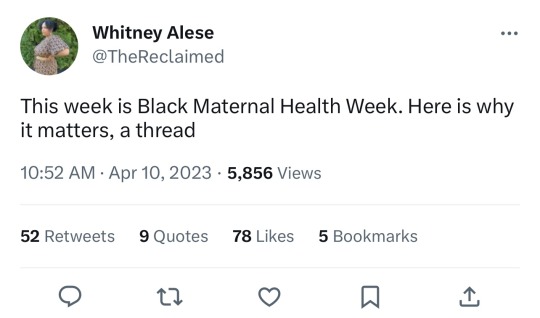



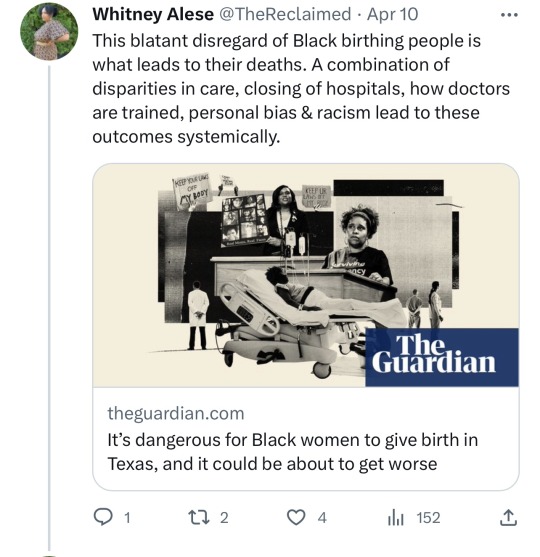
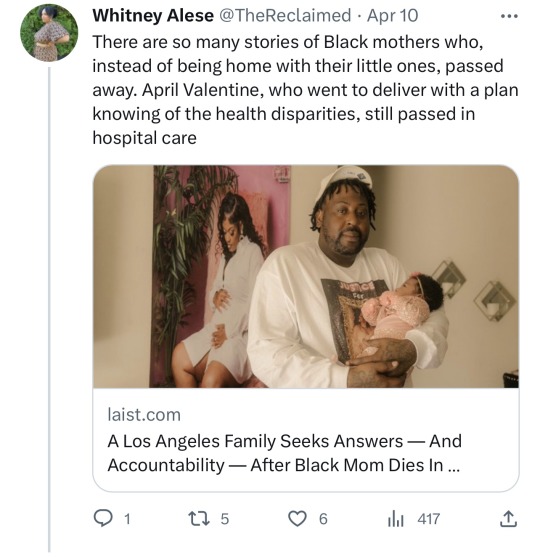

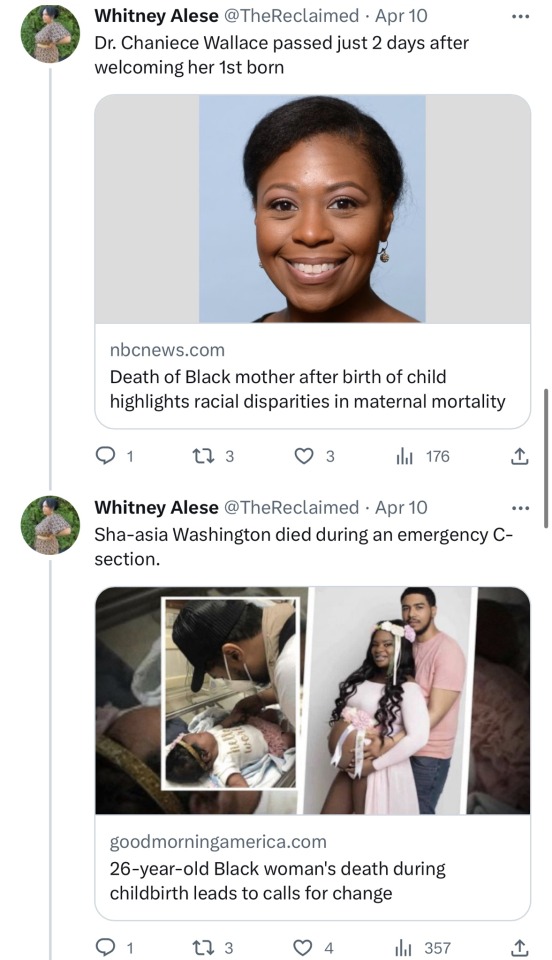

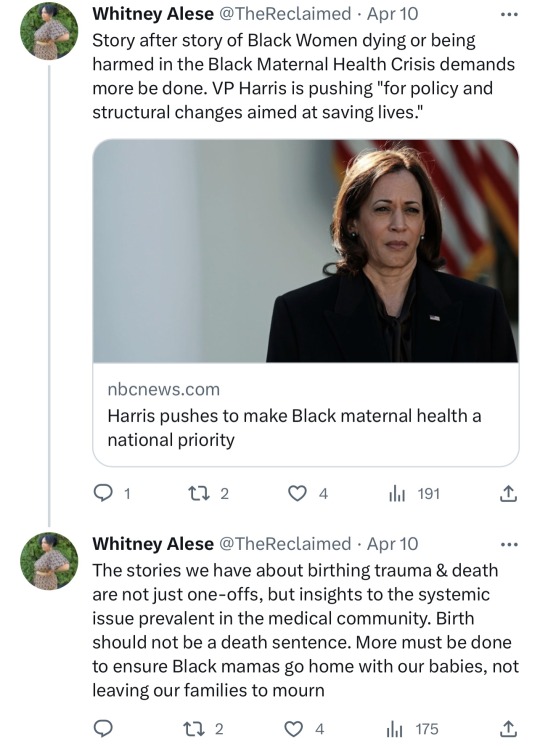
Links:
• https://www.npr.org/sections/health-shots/2023/03/16/1163786037/maternal-deaths-in-the-u-s-spiked-in-2021-cdc-reports
• https://www.vanityfair.com/news/2022/05/bill-cassidy-maternal-mortality-rates
• https://amp.theguardian.com/global-development/2023/mar/17/texas-black-women-maternal-healthcare-crisis-medicaid
• https://laist.com/news/health/april-valentine-childbirth-death-centinela-hospital-los-angeles-black-maternal-mortality-investigation
• https://people.com/health/tk-dad-raising-sons-alone-after-wife-dies-in-childbirth/
• https://www.nbcnews.com/news/amp/ncna1246841
• https://www.goodmorningamerica.com/amp/wellness/story/calls-change-26-year-black-woman-dies-childbirth-71698417
• https://www.goodmorningamerica.com/wellness/story/calls-change-26-year-black-woman-dies-childbirth-71698417
• https://www.wsj.com/articles/black-mothers-in-new-york-are-more-likely-to-have-life-threatening-complications-in-childbirth-11597268700
• https://www.nbcnews.com/news/nbcblk/harris-pushes-make-black-maternal-health-national-priority-rcna24630
#politics#black maternal health week#blacklivesmatter#medical racism#black maternal health#black maternity#racial bias#racism#black infant mortality rate#two americas
166 notes
·
View notes
Photo
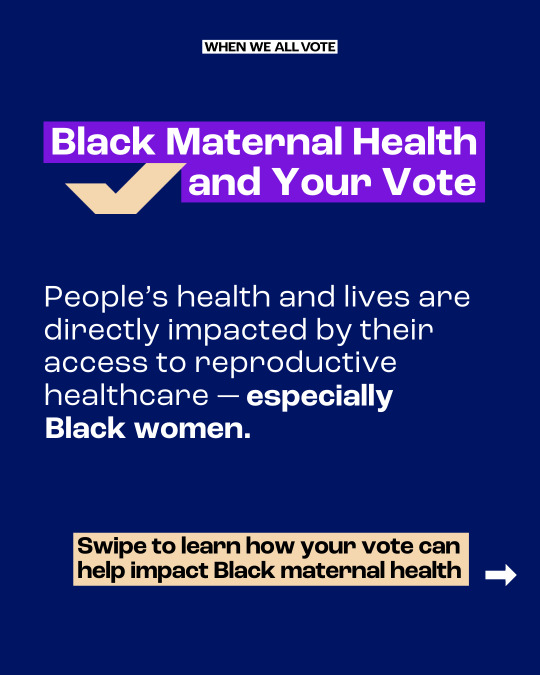
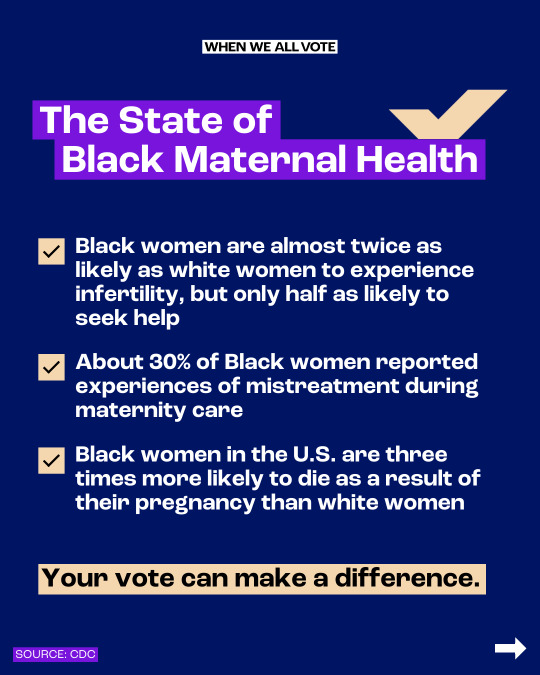

This Black Maternal Health Week, we’re bringing awareness to the staggering rates of Black maternal mortality and morbidity across the country.
Black mothers deserve access to the healthcare they need throughout pregnancy, childbirth, and postpartum.
The people we elect make decisions that impact our access to reproductive healthcare. Make sure you are registered to vote NOW at weall.vote/register. 💜
#black maternal health week#black maternal health#black women#black moms#black mothers#black health#reproductive health#reproductive justice#reproductive freedom#vote#voting#voter#register to vote#ballot#election#elections#black lives matter#blm
16 notes
·
View notes
Text
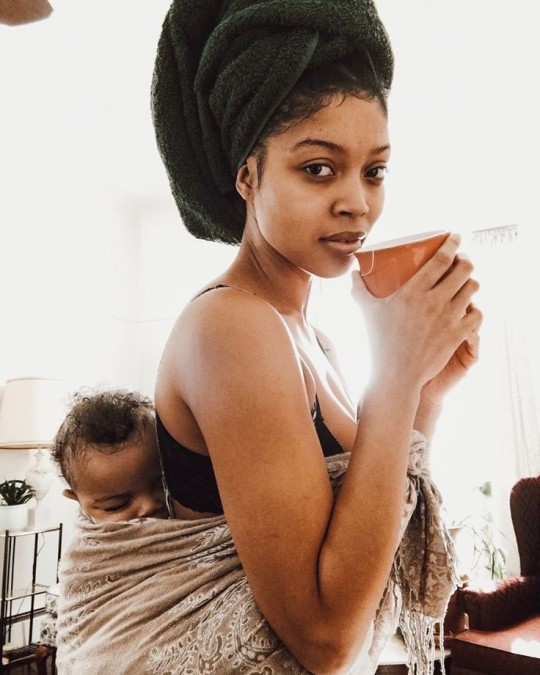
#black parenting#black women#black art#black birth#black mothers#black pregnancy#black girl magic#black man#black love#black motherhood#black maternal health#black mamas matter#black maternal health week#black femininity#black feminism#black lives are precious#black lives are important#BMSC
61 notes
·
View notes
Text
Hey Tumblr! Black women in the US are at a higher risk of dying from pregnancy-related complications. Let's address this issue during Black Maternal Health Week. We can eliminate racial disparities in maternal health by addressing systemic racism and poverty and supporting access to quality healthcare services. Join us in advocating for policy changes and supporting community-based organizations working towards improving maternal health outcomes for Black women.
Black Maternal Health Week: Addressing Racial Disparities in Maternal Health
Maternal health is an essential issue in the United States, and Black Maternal Health Week is a week-long initiative aimed at addressing the racial disparities in maternal health outcomes. The week takes place every year from April 11th to April 17th, and it is an opportunity to raise awareness about the challenges faced by Black women during pregnancy and childbirth.
The Centers for Disease…
View On WordPress
#Black Community#Black Lives Matter#Black Maternal Health Week#Black Moms Matter#Community Support#Health Disparities#Maternal Health#Maternal Mortality#Racial Justice#Reproductive Justice#Support Black Women
7 notes
·
View notes
Text
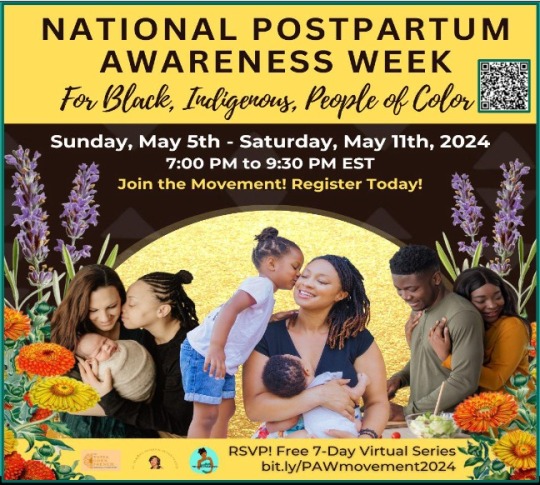




2 notes
·
View notes
Text
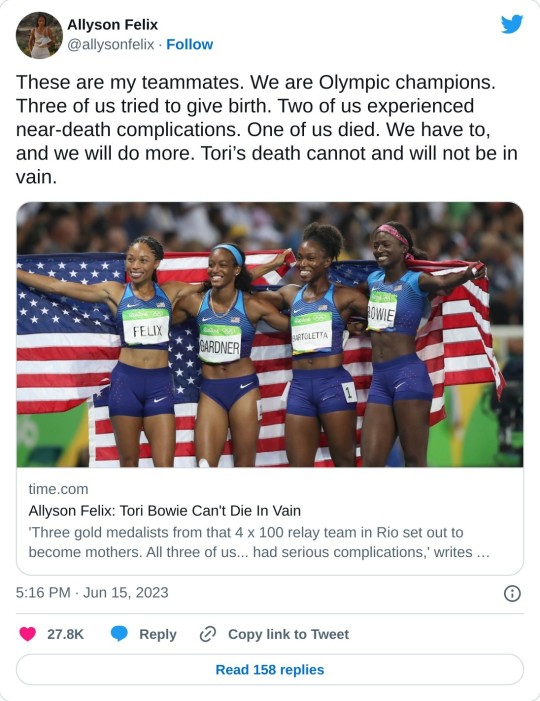
My former U.S. Track and Field teammate Tori Bowie, who was found dead in her home in Florida on May 2, of complications related to childbirth at 8 months pregnant, was a beautiful runner. She was effortless. At the Rio Olympics, I ran the second leg of the 4 x 100 relay. Tori was the anchor. When she got the baton, I remember thinking, “it’s over.” She just accelerated. When she crossed the finish line, I couldn’t wait to run over to her to celebrate. It was her first, and only, Olympic gold medal.
She also picked up a silver (in the 100-m) and bronze (200-m) in Brazil. The next year, at the 2017 World Championships in London, Tori won the 100-m title, earning the title of “world’s fastest woman.” Tori started out as a long jumper. So seeing her thrive as a sprinter was a huge deal. She was just such a bright light, and people were getting to see that.
Tori grew up in Mississippi and had this huge Southern accent. She didn’t take herself too seriously. You felt this sense of ease when you were around her. I last saw her in early 2021, in San Diego, where she was training. She gave me the biggest hug; something about her spirit was just very, very sweet. I felt her sweetness come over me that day.
Tori was 32 when she died. According to the autopsy, possible complications contributing to Bowie’s death included respiratory distress and eclampsia—seizures brought on by preeclampsia, a high blood pressure disorder that can occur during pregnancy. I developed preeclampsia during my pregnancy with my daughter Camryn, who was born in November 2018. The doctors sent me to the hospital, where I would deliver Camryn during an emergency C-section, at 32 weeks. I was unsure if I was going to make it. If I was ever going to hold my precious daughter.
Like so many Black women, I was unaware of the risks I faced while pregnant. According to the CDC, in 2021 the maternal mortality rate for Black women was 2.6 times the rate for white women. About five days before I gave birth to Camryn, I was having Thanksgiving dinner with my family. I mentioned that my feet were swollen. As we went around the table, the women shared their experiences during pregnancy. My cousin said she also had swollen feet. My mom didn’t. Not once did someone say, ‘oh, well, that’s one of the indicators of preeclampsia.’ None of us knew. When I became pregnant, my doctor didn’t sit me down and tell me, ‘these are things that you should look for in your pregnancy, because you are at a greater risk to experience these complications.’
That needs to change, now, especially in light of Tori’s tragic passing. Awareness is huge. Serena Williams had near-death complications during her pregnancy. Beyoncé developed preeclampsia. I hate that it takes Tori’s situation to put this back on the map and to get people to pay attention to it. But oftentimes, we need that wake-up call.
The medical community must do its part. There are so many stories of women dying who haven’t been heard. Doctors really need to hear the pain of Black women.
Luckily, there’s hope on several fronts. Congress has introduced the Momnibus Act, a package of 13 bills crafted to eliminate racial disparities in maternal health and improve outcomes across the board. California passed Momnibus legislation back in 2021. These laws make critical investments in areas like housing, nutrition, and transportation for underserved communities. Further, several pharmaceutical companies are making advances on early detection and treatment of preeclampsia.
Three gold medalists from that 4 x 100 relay team in Rio set out to become mothers. All three of us—all Black women—had serious complications. Tianna Madison has shared that she went into labor at 26 weeks and entered the hospital “with my medical advance directive AND my will.” Tori passed away. We’re dealing with a Black Maternal Health crisis. Here you have three Olympic champions, and we’re still at risk.
I would love to have another child. That’s something that I know for sure. But will I be here to raise that child? That’s a very real concern. And that’s a terrifying thing. This is America, in 2023, and Black women are dying while giving birth. It’s absurd.
I’m hopeful that things can get better. I’m hopeful that Tori, who stood on the podium at Rio, gold around her neck and sweetness in her soul, won’t die in vain.
—as told to Sean Gregory
#Tori Bowie#Black Lives Matter#Black Mothers Health#Black Maternal Health#Allyson Felix: Tori Bowie Can't Die In Vain#Black Lives of Children Matter#Black Health Matters
10K notes
·
View notes
Note
Sorry for this but as a disabled Haitian black woman living in America, I cannot sympathize nor agree with Israel’s actions against Palestinian people and their own people. What they did to Ethiopian Jewish Women when they they sterilized them with their consent. I cannot support Israel ruthlessly bombing churches, schools, and people’s homes where people live. I feel so bad for the Palestinian people and hostages who have to deal with ruthless bombng in Gaza.
The lie that Israel sterilized Ethiopian women has been debunked countless times, and yet it persists and is used by pro-Palestinians to be like "Look! Israel really is apartheid!" so that you don't ask them why they have had black Ethiopian Jewish man Avera Mangisto hostage for 9 years, or why they beheaded a black man during the Hamas attacks with a shovel. So let's talk about it.
Israel never forcibly sterilized Ethiopian women. They provided them with the depo shot, which needs to be renewed every 12 weeks or it becomes ineffective, or in other words, you can get pregnant again. It is not sterilization.
So, why did Israel give Ethiopian women the depo shot?
Ethiopian women arrived to Israel in either transit or refugee camps due to them fleeing a genocide, both of which are always in constant need of birth control. They need birth control for a few reasons, the major one being that infant and maternal mortality rates in transit and refugee camps are incredibly high, few gynecologists are available to work at these camps, sexual violence is also higher in these camps than the general population, and post-partum care is lacking for the same reason that gynecologists are. This is true in every transit or refugee camp, not just in Israel. The advantage of the depo shot specifically is because it decreases the bleeding for women on their menstrual cycle, which is good when the camps are lacking in menstrual products, which can lead to health problems. If they were to get pregnant at the camp and decide to have an abortion, the mortality rates are, as predicted, incredibly high. I would also like to add that it is standard procedure to provide women in refugee/transit camps with birth control.
Due to the high volume of people at these camps who need medical care, and the shortness of staff, as well as a language barrier, it is possible some patients do not understand what is being administered. This means that it is a case of negligent medical care, and not eugenicist sterilization of black women. The conditions since the initial absorption of Ethiopian refugees has increased, given that there is no longer a rush to get them situated, and the Ethiopian population in Israel has grown substantially. That could not happen if the women were sterilized. Their population is now well over 160,000 and make up 2.3% of the population.
The accusation that Israel forcibly sterilized these women is as heinous as it is ridiculous, considering Israel was the one who did rescue operations to get them to safety in the first place. This is not to say that there is not racism in Israel, but there is racism in every country on the face of this planet, and Israel's racism is not so great that they forcibly sterilized an entire population of black women.
498 notes
·
View notes
Text
Fatal Attraction
Chapter One


Pairings: Wanda Maximoff x GN! Reader/ Wanda Maximoff x Jarvis Stark
Warnings : Fluff. Angst.
Taglist : @natashamaximoff-69 @canvascoloredin @wizardofstories @louxbloom @wandanats-goodgirl @the-ox-fan20 @ladyqueenxoxo @aemilia19 @wandaromamoff69 @mfd-101 @dorabledewdroop
18+ MINORS DNI
Wanda Maximoff, was known as Jarvis Stark's new wife, and NYU graduate, that was all. Once Jarvis had gotten a job at his father's company, Wanda had quickly adjusted to the stay at home housewife. Even after she had done her morning chores and meal preps, she wasted a majority of the day either sitting on the sofa watching TV or just staring out of the window at the bustling city below. Even her latest conversations with Jarvis made her want to retreat from him.
"I think we should try for a baby." He told her as her eyes widened.
"What?" She almost yelled across the table from him.
"We're married now." He stated.
"Barely." She told him as he shrugged.
"I have a steady job and income, we can provide for a baby Wanda." He smiled at her as she shook her head no.
"I don't want a baby Vis." She told him firmly. "I am not ready for that sort of commitment."
"We're already married, Wanda." He told her sternly as Wanda started to clear the table. "I think not being ready for commitment has already passed."
"No." She told him as she squeezed her eyes closed. "Being married is different to starting a family. We are both 22 for crying out loud."
"All the more reason to do it." He told her. "By the time they will be off to college we will just be pushing passed 40, an age to start living our lives again."
"I said no Jarvis." She snarled as he just sighed.
"Just think about it." He requested before he retreated to their shared room. Wanda knew exactly how she felt about the whole children's situation.
Did she see herself as a mother at some point? Yes, just not right now. Not when she has a lot of living to do.
So she made it her mission to reject every advance Jarvis had made. Denying his every need to have intimacy with her. She couldn't really sneakily go on birth control as they now had shared health insurance.
So she had done the next best thing, she had made several resumes and sent them out to multiple organisations, hoping that she may just get herself a job and a way to earn her own money and not have to rely on Jarvis's family fund.
Every day she checked the mail, hoping that she may get an acceptance letter, only receiving polite rejection letters.
"I bet you're going to tell me what the others have said huh?" She questioned as she sat with the envelope in her hand. Taking a deep breath before opening the letter and reading the black ink.
Dear Ms Maximoff
Thank you for your resume, and I am afraid that all departments have been filled. Although, I do have an assistant about to go on maternity leave. It is only a temporary position. If you may be interested, please contact me as soon as possible.
Many regards
Y/N Y/L/N
CEO
Wanda was fast to dial up the number provided, although she had waited for half an hour until she was put through to Y/N.
"Y/N Y/L/N, how may I help you?" They answered.
"Hi, Mx Y/L/N, it's Wanda Maximoff." She rambled nervously. "I was just calling up about the temp position you have available?"
"Hi, Ms Maximoff." They spoke cheerfully. "I do have a full week this week but maybe if you can stop by the office at noon? I have 30 minutes spare for lunch if you're free to do your interview then."
"Yes." Wanda answered excitedly. "Of course."
"Perfect." They answered her. "I shall see you at noon. Don't be late." With that they hung up, just before Wanda squealed. She was excited to have a job prospect so soon, but her excitement didn't last too long when Jarvis came inside with one of her resumes in his hand.
"You know, we have been looking to fill some spots in our tech department and when I noticed this on my desk of potential candidates, I thought that couldn't be my Wanda Maximoff but there is only one Wanda Maximoff in New York." He slammed the paper on the table before him. "What are you even doing Wanda?"
"I am looking for a job." She told him.
"You don't need a job." He told her.
"No, but I want a job." She told him. "I am sick and tired of living the same routine every day. It gets extremely lonely."
"Maybe if we try." He started as Wanda interrupted him.
"I already told you no Jarvis!" She yelled. "I am not ready to be a mother!"
"No one is truly ready to be a parent dear." He tried to approach her when she stepped back.
"No." She told him firmly. "I don't want a baby. Not now."
"Wanda! This is something that is expected when we marry." He told her as she laughed.
"We are not living in the 50s!" She told him. "It is my body and I do not want a child."
"It has to be done Wanda." He told her.
"No it doesn't!" She shouted, starting to get angry with every second he wasn't listening to her. "I am 22, freshly out of college, I should be out partying with friends, working a job I hate to try and make ends meet."
"But you don't have to do any of that." He told her.
"Because we have your father's money?" She spoke with a raised brow. "I want to be able to earn my own way Vis, so please just let me." He just nodded as he walked away, leaving Wanda to clean up the dinner that neither had the appetite to eat.
The next day, Wanda was getting ready for her interview with Y/N. She was extremely nervous as she hasn't had a job since she worked part time in high school at the local cafè. So she made sure she was at the building earlier, sipping on a coffee as she waited for Y/N, already being informed that they were in a meeting.
She soon perked up when a door opened and a large group of people left the room. Waiting to see what Y/N looks like.
"Ms Maximoff." They spoke up as they spotted Wanda. "Follow me." She was fast to follow them into their office. Admiring the view from behind them as they sat at their desk. "So, your resume was quite."
"I know, I haven't really had a job since high school." She told them. "But I graduated at the top of my class in college."
"And you are married." They pointed out as they noticed the gold band on her finger. "And you're 22."
"My husband and I have been together since high school." She told them as they smiled softly.
"Well, he is a very lucky guy." They told her before looking at her seriously. "So, why do you want this job?" They asked her.
"Well, I want to be able to make something of myself, earn my own way." She told them. "It's just that Jarvis expects me to stay at home and birth his children but I don't want that."
"You want to be independent." They pointed out as she nodded. "So why did you marry him?"
"I love him." She answered easily, although at that moment, the words felt like a foreign language on her tongue.
"As easy as that." They pried before realising Wanda's unsure gaze. "Forgive me, that was out of line."
"No." She waved them off before looking up again.
"Well, I guess I can have you start on Monday, Jean will show you the ropes before she leaves on Friday." They told her with a smile.
"I got the job?" She asked them, with shock and confusion in her eyes.
"You got the job." They smiled as she squealed. "Just leave your details, social security number and bank account details with Jean."
"Thank you so much Y/N." She stood up as Y/N walked around the desk.
"Be here Monday, 8am." They smiled at her before opening the door for her, the two approaching Jean. "Do you have the files for my next meeting?" She handed them an A4 manilla file. "Also, can you sort out Ms Maximoff's details for your temporary replacement. She will be shadowing you next week before you leave us to have this little guy." Jean nodded with a smile before Y/N had disappeared down the hall and into the elevator.
"They aren't the easiest to work for." Jean told her. "They are perfectionists."
"I can see that." Wanda smiled as she handed over the appropriate papers.
"But they are loyal to their employees." Jean told her. "That is one thing I can say about them." Wanda was fascinated by them, only meeting them briefly but seeing how smart and sophisticated they seemed. It only drew her in, needing to know more. She found herself thinking about them, even when she was laying in bed at night beside her husband. Her thoughts were innocent but she still felt guilty.
#wanda maximoff x reader#wanda maximoff#marvel#elizabeth olsen#wanda x you#elizabeth olsen x reader#wanda x reader#wanda x y/n#wanda maximoff x you
295 notes
·
View notes
Text
"Bria Peacock chose a career in medicine because the Black Georgia native saw the dire health needs in her community — including access to abortion care.
Her commitment to becoming a maternal health care provider was sparked early on when she witnessed the discrimination and judgment leveled against her older sister, who became a mother as a teen. When the Supreme Court overturned Roe v. Wade in 2022, Peacock was already in her residency program in California, and her thoughts turned back to women like her sister.
“I knew that the people — my people, my community back home — was going to be affected in a dramatic way, because they’re in the South and because they’re Black,” she said.
But even though Peacock attended the Medical College of Georgia, she’s doing her obstetrics and gynecology residency at the University of California-San Francisco, where she has gotten comprehensive training in abortion care.
“I knew as a trainee that’s what I needed,” said Peacock, who plans to return to her home state after her residency.
Ever since the Supreme Court decision, California has worked to become a sanctuary for people from states where abortion is restricted. In doing so, it joins 14 other states, including Colorado, New Mexico, and Massachusetts. Now, it’s addressing the fraught issue of abortion training for medical residents, which most doctors believe is crucial to comprehensive OB-GYN training.
A law enacted in September [2023] makes it easier for out-of-state trainees to get up to 90 days of in-person training under the supervision of a California-licensed doctor. The law eliminated the requirement for a training license and also permitted training at programs such as Planned Parenthood that are affiliated with accredited medical schools.
“By allowing physician residents to come to California, where there are more opportunities for abortion training, and by allowing them to be reimbursed for this work, we’re sending a message that abortion care is health care and an essential part of physician training,” said Lisa Folberg, CEO of the California Academy of Family Physicians, which supported the bill.
The question of how to provide complete OB-GYN training promises to become more urgent as the effects of abortion bans on medical education becomes clear: 18 states restrict or ban abortion to the point of effectively stripping 20% of OB-GYN medical residents of the opportunity to get abortion training, according to the Ryan Residency Training Program in Abortion and Family Planning. That’s 1,354 residents this year out of 5,962 OB-GYN residents nationwide.
The restrictions in some cases aim to reach beyond state borders, spooking medical students and residents who fear hostility from anti-abortion groups and right-wing legislators...
Pamela Merritt, executive director of Medical Students for Choice, pointed to a Kansas law that requires repayment of state medical school scholarships — with 15% interest — if residents perform abortions or work in clinics that perform them, except in cases of rape, incest, or a medical emergency.
Doctors point out that abortion training is not just about ending pregnancies. Peacock recalled a patient who started hemorrhaging badly shortly after a healthy delivery. Peacock and her team at UCSF performed a dilation and curettage — a procedure commonly used to terminate pregnancy.
“If we did not have that skill set, and the patient continued to bleed, it could have been life-taking,” said Peacock, chief OB-GYN resident at UCSF...
Peacock, for her part, is adamant about returning to Georgia, where abortions are banned after six weeks. “I’m still going to provide abortions, whether that’s in Georgia or I need to fly to a different state and work in abortion clinics for a week out of the month,” she said. “It would definitely be a big part of my work.”"
-via The 19th, January 2, 2024
#abortion#bodily autonomy#abortion rights#reproductive rights#reproductive justice#united states#us politics#california#georgia#medical student#residency#medical school#healthcare#healthcare access#pro choice#abortion is healthcare#womens rights#trans rights too let's just make that clear#medical training#abortion care#abortion bans#abortion access#doctors#medicine#gynecology#obstetrician#obstetrics and gynecology#gynecologist#good news#hope
179 notes
·
View notes
Text
"Under a Missouri statute that has recently gained nationwide attention, every petitioner for divorce is required to disclose their pregnancy status. In practice, experts say, those who are pregnant are barred from legally dissolving their marriage. “The application [of the law] is an outright ban,” said Danielle Drake, attorney at Parks & Drake. When Drake learned her then husband was having an affair, her own divorce stalled because she was pregnant. Two other states have similar laws: Texas and Arkansas."
"Missouri is particularly restrictive when it comes to reproductive health and autonomy. It was one of the first to ban abortion after Roe v Wade was overturned in 2022, including in cases of rape and incest. Research shows that abortion restrictions can effectively give cover to reproductive coercion and sexual violence: the National Hotline for Domestic Violence said it saw a 99% increase in calls during the first year after the loss of the constitutional right to abortion."
"Advocates are currently trying to gather enough signatures to put a constitutional amendment on the ballot that would make abortion legal until fetal viability, or around 24 weeks."
"In Missouri, homicide was the third leading cause of deaths in connection with pregnancy between 2018–2022, the majority (75%) of which occurred among Black women, according to a 2023 report by the Missouri department of health and senior services, which examines maternal mortality data. In every case, the perpetrator was a current or former partner. And in 2022, 23,252 individuals in the state received services after reporting domestic violence, according to the latest reporting from Missouri Coalition Against Domestic & Sexual Violence, which compiles data from direct service providers in the state."
The dystopia we speak of -across many of issues that women and marginalized folks face is HERE already. This is terrifying.
#feminist#feminism#social justice#current events#current news#missouri#missouri law#united states#partner abuse#tw abuse#intersectionality#intersectional feminism#violence against women#intimate partner violence#intimate partner abuse#divorce#relationship#us law#important#information#pregnancy#gender violence#bodily autonomy#womens rights#reproductive freedom#abortion is healthcare
116 notes
·
View notes
Text
One of the worst consequences of patriarchy is unequal pay and the bad working conditions for women. These include:
no maternal leave
discriminatory hiring practices
harassment from higher-ups and colleagues
lesser pay
no or bad healthcare benefits
etc.
Also, the jobs typically occupied by women are paid worse around the world, while oftentimes being more demanding and higher in stress, such as nurses, teachers, cleaning personnel, etc.
Material equality is crucial for women’s liberation!
In the United States, women in unions make higher wages and reduce the gender pay gap significantly. Women in unions on average make 205 $ more per week.
The union bonus is higher for women than for men, especially for Latina and Black women: unionized Latinas make 271 $ more per week, while Black women make 175 $ more per week. This effect is also true for Asian and white women (Asian women in unions make more than men lmao)
Unions provide health protection for female workers in precarious working conditions: 84 percent of unionized workers have access to employer-sponsored healthcare, while only 54 percent of non-unionized workers have access to healthcare
Patriarchy is a social construct that was implemented to extract free labour from women. Patriarchy is a justification for lesser pay, worse jobs, harassment in the workplace and a healthcare system that is centered around the male body.
If you want to help women, especially women of color, join a union today!
(source)
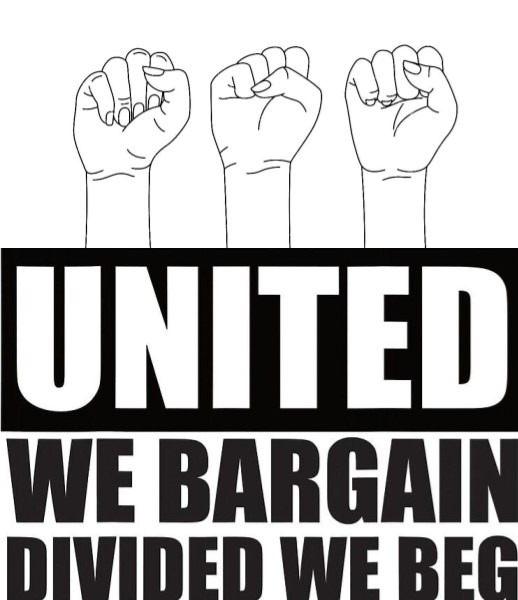
#labor unions#feminism#radical feminism#radical feminists do interact#radical feminists please touch#radblr#union#union strong#labor rights#strike#workers rights#worker solidarity#united states#radical feminist action#radfem action#marxist feminist#marxist feminism#unionization#united we bargain divided we beg#feminist#feminist action#womens rights#women liberation
84 notes
·
View notes
Text

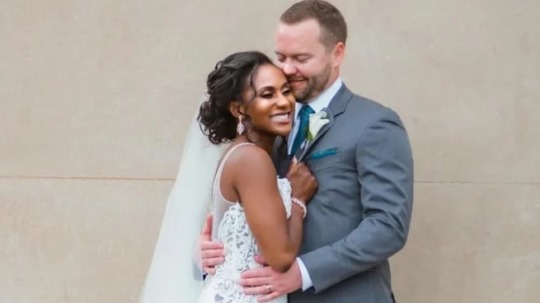
Krystal Anderson, a former cheerleader for the Kansas City Chiefs, died of sepsis last week following a stillbirth, according to her family. She was 40 years old.
Anderson, known to her friends as “Krissy,” was hospitalized at five months pregnant and delivered her daughter, Charlotte Willow, after doctors were unable to locate a heartbeat, friends told FOX4 News. She developed a fever a day after the birth. Her condition worsened and she battled sepsis, which eventually led to organ failure. Despite being placed on life support and undergoing three surgeries, she died early Wednesday morning.
“I feel lost,” her husband, Clayton Anderson, told the station. “There’s a lot of people in this house and it feels empty.”
In her post-NFL career, Anderson taught yoga and worked as a software engineer at Oracle Health. She “fiercely advocated” for both Black women in STEM and women’s health, according to an obituary. She also had a philanthropic streak, and worked with Big Brothers and Big Sisters of KC, the perinatal bereavement nonprofit Gabriella’s Little Library, and the Oracle Health Foundation.
“She was an absolute force for good. She made every room just light up,” her husband said.
While overall maternal deaths in the U.S. have steadily ticked up over the past two decades, Black women remain two to three times more likely to die in childbirth than white women, according to data from the Centers for Disease Control and Prevention. With the risks to Black mothers exacerbated by implicit bias and medical racism, they are also more likely to experience life-threatening complications like preeclampsia, postpartum hemorrhage, and blood clots.
“It’s, you know, we say, the best country in the world, right?” Anderson’s husband told FOX4 News. “Not if you’re a Black pregnant woman, it’s not—and that needs to change.”
(continue reading)
59 notes
·
View notes
Text
At present, it is standard among practically all communities to fête the family as a bastion of relative safety from state persecution and market coercion, and as a space for nurturing subordinated cultural practices, languages, and traditions. But this is not enough of a reason to spare the family. Frustratedly, Hazel Carby stressed the fact (for the benefit of her white sisters) that many racially, economically, and patriarchally oppressed people cleave proudly and fervently to the family. She was right; nevertheless, as Kathi Weeks puts it: “the model of the nuclear family that has served subordinated groups as a fence against the state, society and capital is the very same white, settler, bourgeois, heterosexual, and patriarchal institution that was imposed by the state, society, and capital on the formerly enslaved, indigenous peoples, and waves of immigrants, all of whom continue to be at once in need of its meagre protections and marginalized by its legacies and prescriptions” (emphasis mine). The family is a shield that human beings have taken up, quite rightly, to survive a war. If we cannot countenance ever putting down that shield, perhaps we have forgotten that the war does not have to go on forever.
This is why Paul Gilroy remarked in his 1993 essay “It’s A Family Affair,” “even the best of this discourse of the familialization of politics is still a problem.” Gilroy is grappling with the reality that, in the United Kingdom as in the United States, the state’s constant disrespect of the Black home and transgression of Black households’ boundaries, as well as its disproportionate removal of Black children into the foster-care industry, understandably inspires an urgent anti-racist politics of “familialization” in defense of Black families. Both the British and American netherworlds of supposedly “broken” homes (milieus that are then exoticized, and seen as efflorescing creatively against all odds), have posed an obstinate threat to the legitimacy of the family regime simply by existing, Gilroy suggests. The paradox is that the “broken” remnant sustains the bourgeois regime insofar as it supplies the culture, inspiration, and oftentimes the surrogate care labor that allows the white household to imagine itself as whole. As a dialectician, “I want to have it both ways,” writes Gilroy, closing out his essay. “I want to be able to valorize what we can recover, but also to cite the disastrous consequences that follow when the family supplies the only symbols of political agency we can find in the culture and the only object upon which that agency can be seen to operate. Let us remind ourselves that there are other possibilities.
There are other possibilities! Traces of the desire for them can be found in Toni Cade (later Toni Cade Bambara)’s anthology The Black Woman, published in America in 1970, not long after the publication of the US labor secretariat’s “Moynihan report,” The Negro Family: The Case for National Action. The open season on the Black Matriarch was in full swing. And certainly not all of the anthology’s feminists, in their valiant effort to beat back societal anti-maternal sentiment (matrophobia) and the hatred of Black women specifically (more recently known as “misogynoir”), make the additional step of criticizing familism within their Black communities. But one or two contributors do flatly reject the notion that the family could ever be a part of Black (collective human) liberation. Kay Lindsey, in her piece “The Black Woman as a Woman,” lays out her analysis that: “If all white institutions with the exception of the family were destroyed, the state could also rise again, but Black rather than white.” In other words: the only way to ensure the destruction of the patriarchal state is for the institution of the family to be destroyed. “And I mean destroyed,” echoes the feminist women’s health center representative Pat Parker in 1980, in a speech she delivered at ¡Basta! Women’s Conference on Imperialism and Third World War in Oakland, California. Parker speaks in the name of The Black Women’s Revolutionary Council, among other organizations, and her wide- ranging statement (which addresses imperialism, the Klan, and movement- building) purposively ends with the family: “As long as women are bound by the nuclear family structure we cannot effectively move toward revolution. And if women don’t move, it will not happen.” The left, along with women especially of the upper and middle classes, “must give up ... undying loyalty to the nuclear family,” Parker charges. It is “the basic unit of capitalism and in order for us to move to revolution it has to be destroyed.”
Forty years later, the British writer Lola Olufemi is among those reminding us that there are other possibilities: “abolishing the family...” she tweets, “that’s light work. You’re crying over whether or not Engels said it when it’s been focal to black studies/black feminism for decades.” For Olufemi as for Parker and Lindsey, abolishing marriage, private property, white supremacy, and capitalism are projects that cannot be disentangled from one another. She is no lone voice, either. Annie Olaloku-Teriba, a British scholar of “Blackness” in theory and history, is another contemporary exponent of the rich Black family-abolitionist tradition Olufemi names. In 2021, Olaloku-Teriba surprised and unsettled some of her followers by publishing a thread animated by a commitment to the overthrow of “familial relations” as a key goal of her antipatriarchal socialism. These posts point to the striking absence of the child from contemporary theorizations of patriarchal domesticity, and criticize radicals’ reluctance to call mothers who “violently discipline [Black] boys into masculinity” patriarchal. “The adult/child relation is as central to patriarchy as ‘man’/‘woman,’” Olaloku-Teriba affirms: “The domination of the boy by the woman is a very routine and potent expression of patriarchal power.” These observations reopen horizons. What would it mean for Black caregivers (of all genders) not to fear the absence of family in the lives of Black children? What would it mean not to need the Black family?
Sophie Lewis in “Abolish Which Family?” from Abolish the Family: A Manifesto for Care and Liberation, 2022.
177 notes
·
View notes
Text

#black parenting#black women#black art#black birth#black mothers#black pregnancy#black girl magic#black love#black fatherhood#black man#black fathers#black babies#black power#black mamas matter#black motherhood#black maternal health#black maternal health week#blackmaternalwellness
22 notes
·
View notes
Text
Ending the COVID emergency will further harm Black maternal mortality | The Hill
this year’s calls to celebrate Black Maternal Health Week ring hollow because the Biden administration recently ended the COVID-19 national emergency ahead of schedule and will allow the public health emergency to expire on May 11. This means that most Americans, and certainly those from historically excluded groups, will no longer have access to free at-home COVID tests or vaccines and testing services without cost sharing. Hospitals and clinics across the U.S. have ended or are ending mask mandates, which places patients and newborns at higher risk of COVID exposure. These actions have been met with shockingly little public pushback from advocates for Black reproductive health, despite the fact that COVID has disproportionately orphaned Black children.
It is now clear that COVID likely drove much of the sizable increases in deaths resulting from pregnancy, including an 18 percent increase from 2019 to 2020 and a nearly 40 percent increase from 2020 to 2021. For Blacks, the data are bleakest: the overall mortality rate is the highest seen in recent history — 69.9 per 100,000 live births. Contracting COVID during pregnancy increases the risk of health complications, including maternal morbidity and within-hospital mortality. COVID is why Atlanta resident Marrisha Kindred Jenkins died before getting to hold her infant son for the first time. This much we know.
But there is much that is unknown. We do not yet have a complete picture of the long-term effects of COVID on reproductive health. Yet, if the past remains prologue, Black people will likely shoulder a disproportionate share of long COVID’s effects on reproduction. While prenatal vaccination can reduce COVID-related risks during pregnancy and pass on protection to babies, vaccination rates for the pregnant remain low, particularly among Blacks.
267 notes
·
View notes
Text
Meeting Registration - Zoom
1 note
·
View note